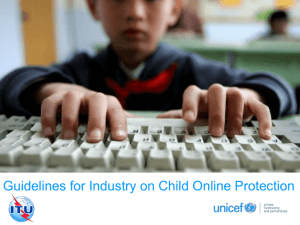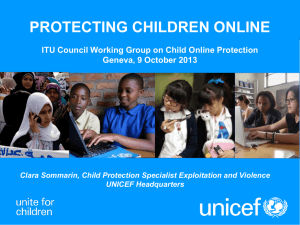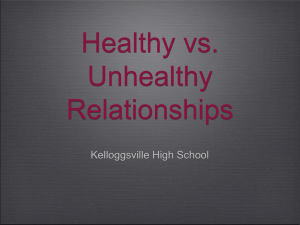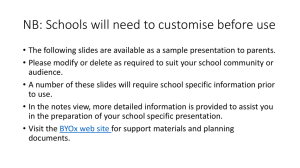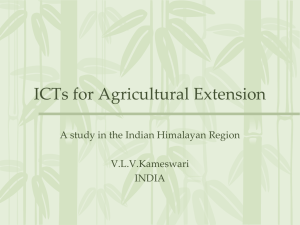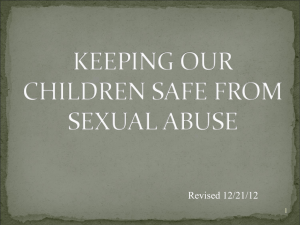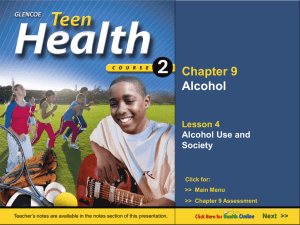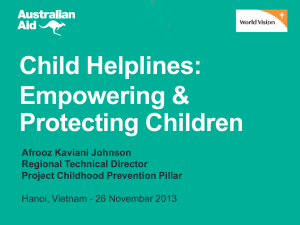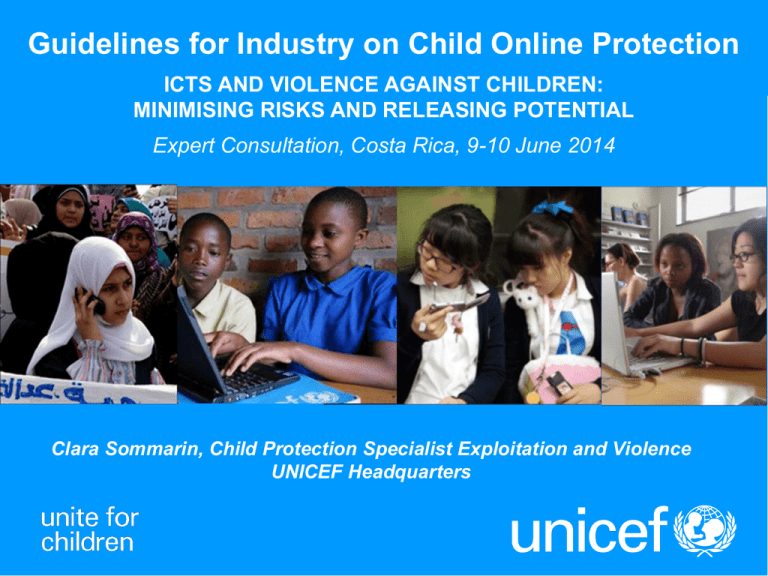
Guidelines for Industry on Child Online Protection
ICTS AND VIOLENCE AGAINST CHILDREN:
MINIMISING RISKS AND RELEASING POTENTIAL
Expert Consultation, Costa Rica, 9-10 June 2014
Clara Sommarin, Child Protection Specialist Exploitation and Violence
UNICEF Headquarters
1
UNICEF Child Protection Strategy and ICTs
• Create greatest possible opportunity for all children to take advantage of
the benefits offered by ICTs, minimizing risks and potential harm
• Balance the right to protection from all forms of violence, abuse and
exploitation with the right to information, freedom of expression and
association, privacy and non-discrimination
• Requires a multi-stakeholder and sectorial approach: collaboration with
governments, parliamentarians, civil society, the private sector, professionals
working with children, parents and children themselves
• Four strategic areas should underpin national and international response:
o Empowering children and enhancing resilience to harm
o
o
o
Preventing impunity for abusers
Reducing availability and access to harm
Promoting the recovery of children exposed to harm
UNICEF Child Protection Strategy and ICTs
• Increasingly UNICEF country offices address children’s use of ICTs
• Strategies to address ICT related violence and exploitation must be part
of wider national strategies to address violence, exploitation and abuse
taking place through other modalities. Focus on:
Strengthening national child protection systems to support
prevention and service response to violence, exploitation and
abuse facilitated through ICTs
Laws, policies, regulations and comprehensive services for all
abused/exploited children, across all social sectors - justice, social
welfare, education, health and the ICT sector
Support norms, attitudes and behaviors that prevent violence
and exploitation
Promoting positive, protective norms and behaviours working with
communities, parents, teachers, children and industry
Child online protection and participation
© UNICEF/NYHQ2010-1016/OLIVIER ASSELIN
Date of Presentation
CHILDREN’S RIGHTS IN THE “VIRTUAL” WORLD
The response needs to strike a balance between the right to
protection and the right to participation.
Privacy
Freedom of
expression
Access to
Information
Protection
from violence
Protection from
sexual abuse and
exploitation
5
Education
Nondiscrimination
Play and
leisure
Culture
Recreation
WHICH COMPANIES HAVE RESPONSIBILITY?
Companies that offer Internet and associated technologies
Social
media
Apps
developers
Online
retailers
Mobile
operators
Internet
services
providers
Internet &
associated
technologies
Hardware
Internet
in public
spaces
Content
providers
CHILD RIGHTS RISKS
Children can be victims, receivers, participants and initiators of
risky online behaviour.
Child sexual abuse
• Recorded images of children subjected to
sexual abuse and exploitation
Inappropriate
content
• Exposure to violent or adult content
• Exposure to content that promotes self-harm
Inappropriate
conduct
• Cyberbullying
• Self-exposure, sexting
Inappropriate
contact
• Grooming
Other
• Predatory e-commerce (privacy, subscription terms,
advertising, etc)
• Internet addiction
OPPORTUNITIES TO PROMOTE CHILDREN’S RIGHTS
Companies can facilitate children’s positive use of ICTs.
Article 13 of
the CRC
The child shall
have the right to
freedom of
expression; this
right shall include
freedom to seek,
receive and
impart
information and
ideas of all kinds,
regardless of
frontiers, either
orally, in writing or
in print, in the
form of art, or
through any other
media of the
child’s choice.
Express their
opinions and
views
Participate in
digitized
social
functions
Innovate and
create
solutions
Bring forward
problems and
needs
Internet
technologies
can help
children to:
Access
educational
content and
job
opportunities
Access
information
about their
rights
Demand
government
accountability
ITU/UNICEF GUIDELINES FOR INDUCTRY ON CHILD
ONLINE PROTECTION
The Guidelines outline five key areas for protecting and promoting children’s
rights in the online environment
Policies and
management
processes
Integrate
children’s
rights in
policies and
management
processes
Child sexual
abuse material
Safer and age
appropriate
environment
Develop
processes for
handling child
sexual abuse
material
Develop safer
and age
appropriate
online
environments
Educate
children, parents
and teachers
Educate
children,
parents and
teachers on
children’s
safety
Promote
positive use of
ICTS
Promote
digital
technology as
a mode to
further civic
engagement
Purpose of document is to provide:
A blueprint that can be adapted locally for various industry players
Establish a benchmark for recommended actions
Guidance on identifying, preventing and mitigating risks
Guidance on supporting children’s rights
COP INITIATIVE PARTNERS
The process to revise the Guidelines was led by ITU and UNICEF
along with business, civil society and government representatives –
Broad consultative process with stakeholders in 2013
ITU/UNICEF CHILD ONLINE PROTECTION GUIDELINES
Policies and
management
processes
Child sexual
abuse material
Safer and age
appropriate
environment
Educate
children, parents
and teachers
Promote
positive use of
ICTS
• Allocate responsibility to senior staff
• Develop a child protection/safeguarding policy and/or
integrate online risks and opportunities into other relevant
policies
• Integrate due diligence on child online protection issues into
assessment processes and identify impacts on different age
groups
• Consult key stakeholders, including children and young
people, on online safety mechanisms for guidance/feedback
• Establish grievance, remedy and reporting mechanisms
ITU/UNICEF CHILD ONLINE PROTECTION GUIDELINES
Policies and
management
processes
Child sexual
abuse material
Safer and age
appropriate
environment
Educate
children, parents
and teachers
• Put in place procedures to ensure
compliance under local/international
laws
• Use customer terms and conditions to
state company’s position on misuse
• Develop notice and take down
processes for reporting of CSAM
• Collaborate with local or national
law enforcement and national
hotlines
Promote
positive use of
ICTS
ITU/UNICEF CHILD ONLINE PROTECTION GUIDELINES
Policies and
management
processes
Child sexual
abuse material
Safer and age
appropriate
environment
Educate
children, parents
and teachers
• Employ technical measures: age-verification,
block/allow lists, spend/time controls,
filtering, and opt-out
• Communicate clear house rules
• Classify content in line with national
standards
• Set heightened default privacy settings
• Offer reporting tools and processes
• Align with relevant marketing regulations
• Promote national support services for children
Promote
positive use of
ICTS
ITU/UNICEF CHILD ONLINE PROTECTION GUIDELINES
Policies and
management
processes
Child sexual
abuse material
Safer and age
appropriate
environment
• Clearly describe content and
parental controls in accessible
language
• Educate customers to manage
concerns on Internet usage
• Set up mechanisms and
educate parents to be involved
• Work in collaboration with
government and educators
• Provide materials for use in
schools and homes
Educate
children, parents
and teachers
Promote
positive use of
ICTS
ITU/UNICEF CHILD ONLINE PROTECTION GUIDELINES
Policies and
management
processes
Child sexual
abuse material
Safer and age
appropriate
environment
• Prevent over blocking of
content
• Develop content that promote
children’s rights to express
themselves
• Develop educational platforms
• Promote digital literacy,
capacity building, and ICT skills
• Support government priorities
and civil society on ICT access
Educate
children, parents
and teachers
Promote
positive use of
ICTS
SECTOR-SPECIFIC CHECKLISTS
The Guidelines offer sector-specific checklists for the following
sectors:
Sector-specific checklists
Mobile operators
Internet service providers
Content providers, online retailers and applications developers
User-generated content, interactive and social media service providers
National and public service broadcasting
Hardware manufacturers
Policies and
management
processes
Child sexual
abuse material
Safer and age
appropriate
environment
Educate
children, parents
and teachers
Promote
positive use of
ICTS
NEXT STEPS
• Finalization of the Guidelines
• Broad dissemination of Guidelines among all stakeholdersIndustry, Governments, civil society in all regions
• Internally UNICEF – collaboration between Corporate Social
Responsibility and Child Protection

